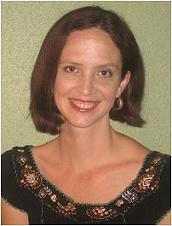 Julie Clawson is the author of Everyday Justice: The Global Impact of Our Daily Choices (2009). She describes herself as “Mom, Writer, Activist, Dreamer” who has “worked as a telemarketer, librarian, substitute teacher, children’s pastor, and church planter” but now balances her time between her family, writing her blog, and her studies at Seminary of the Southwest. Those interested in connecting with her can friend her on Facebook or follow her on Twitter.
Julie Clawson is the author of Everyday Justice: The Global Impact of Our Daily Choices (2009). She describes herself as “Mom, Writer, Activist, Dreamer” who has “worked as a telemarketer, librarian, substitute teacher, children’s pastor, and church planter” but now balances her time between her family, writing her blog, and her studies at Seminary of the Southwest. Those interested in connecting with her can friend her on Facebook or follow her on Twitter.
Yesterday Clawson wrote an excellent introductory article regarding her understanding of the four views Christians hold about LGBT people.
Since most people seem to think churches’ stances are limited to the either/or of complete rejection or full acceptance, I thought it was helpful to reflect on the more nuanced opinions that are out there. I’ve decided to post the list of views I came up with below . . .
I want to post this list to see what other options the readers here might have to contribute. The point of this is not to argue which view is right, but merely to list what views are held by church.
While she goes into greater detail, the first few sentences explaining each group provide an adequate understanding:
- This group thinks all forms being gay are a willful choice to sin against God and the Bible. While they might not use hate speech like Fred Phelps, they generally won’t allow gay people to attend their churches. If they do, they insist that they repent and seek a cure for their sinful choices.
- The second group would still say that being gay is unbiblical/sinful, but they would be more nuanced and loving in that assertion. They may or may not see being gay as a choice, but they will generally admit that it is something that goes so deep in a person that they cannot willfully choose not to be gay. So while they might say that being gay may not be a choice (and therefore not wrong in and of itself), for them acting on gay desires is always wrong.
- The third group generally believes that being gay is a condition and not a choice. They may or may not believe that practicing being gay is biblical or not, but what they believe about that matters less than the fact that they know they need to be loving and accepting of all people. Gay people are God’s beloved just as hetero people are, so the church should love them just as God loves them. The discussions here are generally about rights and justice. The language is that all people should be granted the same benefits of civil society no matter who they love. So gay marriage is supported and any discrimination whatsoever is fought against and condemned.
- In the fourth group I would place those that have devoted the time to digging through scripture and history and have decided that there is nothing unbiblical about same-sex relationships. Their decision generally isn’t based on cultural-pressure or a sense of tolerance, but the conclusion of a serious wrestling with scripture . . . They will be advocates for the gay community when needed, but since their theology doesn’t see gay people as other, they often don’t see people first by that label. They often have a hard time finding churches where they fit in as many churches either still see gay people as somehow inferior or make the entire church’s identity about including gay people.
So What?
Far too many Christians and non-Christians alike characterize Christianity as speaking with one voice on this topic. Take a few moments to locate your own understanding while also pondering the diverse perspectives of those you know.
- Which group are you in today? What has helped you form this view (searching scripture, denominational tradition, relationships, books, etc.)?
- Have you ever been a part of a different group? If so, what initially attracted you to it? Why did you leave?
- Would you belong to or be an active participant in a congregation that officially took a position different from your own? Why or why not?
- How can Christians do a better job of discussing this issue with one another?
- Why do you think this issue become so divisive over the last few decades, especially in some of the well known mainline denominations? What do you believe it will take for this to no longer be central in those contexts?